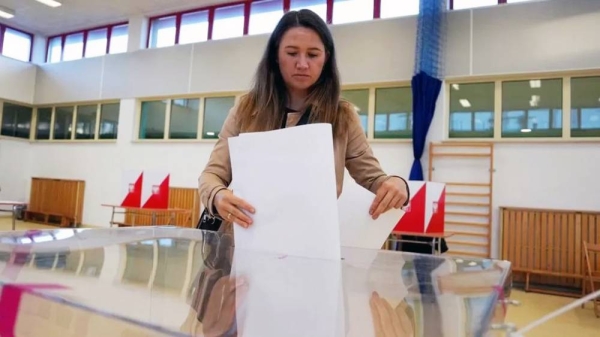
Millions of Russians will cast their vote this weekend in a general election expected to bring little political change. Some 14 parties are fielding candidates for half of the 450 seats in the State Duma in an election scheduled to run until Sunday.
But just four parties are likely to meet the 5 percent threshold necessary to get a seat, and President Vladimir Putin"s United Russia party is set to comfortably hold its majority.
The vote has been marred by allegations of malpractice that could cast doubt on the results in some quarters, although United Russia appears certain to win.
Gennady Zyuganov, the head of the Community Party, called on Saturday for police and the national electoral commission to look into "a number of absolutely egregious facts" including alleged ballot-stuffing in some regions.
Zyuganov said his party has tallied at least 44 incidents of voting violations and had applied for permits to hold protests next week after the voting ends on Sunday.
On Saturday, the news website Znak said a resident of the Moscow region had been offering 1,000 rubles ($15) to people who voted for United Russia.
The publication said it called the man, who said the payment would come if the caller provided evidence of their vote through a messaging app.
The Organization for Security and Cooperation in Europe (OSCE) did not send observers this year, citing excessive restrictions by Russia.
But Golos, an independent election-monitoring group, has also reported sealed envelopes for storing ballot tallies being closed and reopened, and lax measures for guarding ballots at polling station, with one set of papers apparently stored overnight in a cabinet with a broken door.
Media outlets in St. Petersburg also reported on suspected cases of “carousel voting,” in which voters cast ballots at several different polling stations.
Elsewhere one of the leaders of the Yabloko party in St. Petersburg, Boris Lazarevich Vishnevsky, discovered in the run-up to the vote that two other candidates — including one from United Russia — had registered under his own name for the concurrent City Council elections.
The two competitors appeared to have changed their names weeks before the election, the 65-year-old said. He added: "Of course, it aims only to confuse people, so that they will make a mistake... Apparently they consider me a strong rival."
The polls opened on Friday with unexpectedly long lines at some polling stations. Independent media suggested this could show that state institutions and companies were making their employees vote.
People in Moscow had few little for political change on Saturday as Russia entered the second day of voting.
"I don"t believe these elections will change anything," said Olga Pritula, a market stallholder. "Nothing changes here. Everything remains the same."
Teacher Elvira Ere said she believed politicians weren"t interested in making ordinary people"s lives better: "They sell oil, gas and waste, but the lives of ordinary people don"t change."
The vote comes after mass protests engulfed Russia earlier this year in response to a state crackdown on opposition groups, including jailed Kremlin critic Alexei Navalny.
Navalny"s Smart Voting initiative, which advises Russians on how best to cast their vote in order to keep United Russia from winning in their constituency, was taken offline by authorities shortly before the election.
In Khabarovsk in Russia"s Far East, a handful of demonstrators also still gather each night to protest the detention of the region"s popular Liberal Democrat governor, Sergei Furgal, who was arrested last year on charges of being involved in killings in 2004 and 2005.
Furgal"s Kremlin-appointed replacement, Mikhail Degtyaryov, is on the ballot for the regional election. “Whoever posed even the smallest threat was barred from running, and they left only spoiler candidates,” said 64-year-old protester Zigmund Khudyakov.
Denis Pedish, a 47-year-old education worker who comes to protests with a packed bag of essentials in case he is detained, told AP: “We constantly live in fear. It"s difficult.
“But people have hope and faith, and are actively fighting the lawlessness of the authorities and the lawlessness of the elections, which are a laughing stock for the world to see."
The polls opened Friday with unexpectedly long lines at some polling stations. Independent media suggested this could show that state institutions and companies were forcing employees to vote.
The election is widely seen as an important part of President Vladimir Putin’s efforts to cement his grip on power ahead of the 2024 presidential polls, in which control of the State Duma, or parliament, will be key.
Although polls indicate that general approval for the Kremlin-backed United Russia party is low, the party is expected to ride to an overwhelming first place in the new parliament.
Putin strives to consolidate power before 2024
The United Russia party, which is loyal to Vladimir Putin, will almost definitely retain its hold on the State Duma despite polls indicating general approval is low.
But some pollsters believe it could lose its current two-thirds majority, which is needed to change the constitution.
The Communists generally support Kremlin initiatives in the parliament, but their gaining seats would be a loss of face for United Russia.
This election is important for Putin as the new lawmakers will still be in post in 2024, when his term officially expires. It"s not yet clear whether he will stand for election again or seek another means to try to stay in power.
The 68-year-old premier still enjoys firm support from many in Russia. Antonina Starikova, 88, a resident of the Siberian village of Desyatovo, said she was voting for United Russia party "so that everyone is united, so that there"s no anger."
Dozens of people have also traveled from the separatist-controlled Donetsk in Crimea, which Russia annexed from Ukraine in 2014, to cast their vote in the country. — Euronews












